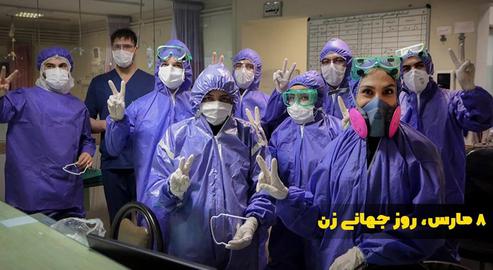After a year of living through the pandemic, many people’s view of health workers in Iran has gone through a sea change. Now, more than ever, they know about the extremely difficult job nurses are doing and empathize with them deeply.
It began in Iran with the death of Narges Khanalizadeh, a 25-year-old nurse in the northern province of Gilan who, like her colleagues, did not even have the most basic PPE to protect her from coronavirus infection. After that hospitals gradually improved safety measures for health workers and provided them with better equipment, but in the past year more than 100 nurses in Iran have died from Covid-19. One of the most recent cases was Mahshid Goodarzi, who was seven months pregnant and gave birth to her baby just hours before her death.
To get a better understanding of how Iranian nurses have been doing since the outbreak, IranWire spoke with two of them working on the frontlines. One, who was on maternity leave when the pandemic started, tells us about the new world she found herself in when she returned to the hospital several months later.
“I Feared my Newborn Baby Would Get Infected”
Masoumeh, 28, is a nurse in one of the hospitals in Gilan. She was on maternity leave for around six months but when she returned to the hospital in late summer 2020 she found the cardiovascular unit where she used to work had been converted to an ICU filled with Covid-19 patients. “When I returned to my own ward it looked nothing like when I had left on leave,” she remembers. “Where am I, I asked myself? It was in the early days of the third wave of coronavirus and the number of daily fatalities was rising little by little to 500.”
During her absence, Masoumeh stayed in contact with colleagues and knew their workload had become much heavier, but she says: “You can’t believe it until you see it with your own eyes. I had yet to learn the protocols for treating Covid-19 patients so it took me several weeks to adapt to the situation, and it got more and more serious in the first two months of autumn.”
There are now around 34,000 frontline health workers in ICUs across Iran and most of them are women. For the past year they have been in constant fear that they might transmit the virus to their families and loved ones. “Our hospital is in a small city, but in the early days after my return we had one or two deaths every shift,” says Masoumeh. “On the other hand, I was also extremely worried that I might carry the virus to my husband and my newborn baby. In those days dealing with the disease and the new requirements of nursing to handle coronavirus were very difficult for me.”
“What If We’re Next?”
Recallling the death of Narges Khanalizadeh, Masoumeh says that for the past year she has been living with the fear that at any moment she might hear that another one of her colleagues has lost her life to Covid-19. “If you remember, the first nurses and doctors who died from coronavirus in Iran were our colleagues in Lahijan,” she says, referring to a city in Gilan province. “Sometimes our colleagues in other groups post news about deaths of colleagues, and their pictures, on social media, and then we talk about what we would do if it happened to us. In the early days of coronavirus I was under double pressure because, on the one hand, I was pregnant and, on the other hand, I was worried about the nurses. It was a nightmare and even now, after several months, it’s still going on.”
So far Iran has not published any statistics about nurses who have died from work pressure or burnout. According to medical literature, “overwork syndrome” often manifests as a heart attack, and since the coronavirus outbreak a number of nurses across the country who were not suffering from underlying diseases have died at the same time as being overworked.
“Nursing, just by itself, is a difficult job and if a person does not love this job and does not love helping others she would never stay on,” says Masoumeh. “Even before coronavirus our job was difficult enough and, besides shortages of equipment, you have to bear the psychological pressure. Just imagine: in this little town, I’ve witnessed three patients die in just one shift. And picture this: in the morning you leave home with full energy, you kiss your baby and you prepare yourself for a busy day, but when you arrive at the hospital and go to the ICU you see three or four of the corpses of patients who died the night before. And that’s just how the day starts.”
Masoumeh says many people do not know what is happening in the country’s ICUs. “Before coronavirus it was different. During our shifts we might have exchanged jokes and laughed together. But with coronavirus we can’t even see each other’s faces. Sometimes, we even forget each other’s faces. Perhaps we see each other’s faces in the locker room, but they aren’t happy faces. Because of coronavirus, the jokes and laughter have died out among the nurses. The atmosphere has turned gloomy, like in a cemetery.”
Dress Code Harassment
“It used to be that they harassed nurses in hospitals because of the way we were dressed,” Masoumeh remembers, “and they would even drag us to the security department over it. But now, thanks to our overalls, masks and caps, we have turned into exactly what officials want us to be: only our eyes are visible and, as officials put it, our dresses no longer show our bodies.
“I must say, though, that in recent years there has been a generational change and female nurses no longer care that much if they are sent to the security department. Nurses have found more courage. Hospital security departments have adjusted to the present conditions as well and, unlike in the past, they don’t give themselves the right to interfere with how nurses are dressed, although the brothers and sisters in the security department are always on the lookout for a few strands of hair showing under nurses’ headgear and gowns that they say are too short.”
“Our Lives are Worthless”
It was in late February 2020 that Iran officially conceded that coronavirus had arrived in the country. In fact the epidemic had begun at least a month earlier and officials did their best to hide it. Before late March 2020 many Covid-19 deaths were attributed to severe pulmonary illness, flu and other causes, and even now there is a dearth of trust in Iran’s coronavirus statistics.
Shamim is a nurse who has been taking care of Covid-19 patients in Tehran hospitals for close to a year. In December 2019 and January 2020, she says, “We didn’t know much about this disease and didn’t think the virus had come to Iran. There were no health protocols to follow and we tended to patients without masks or protective gowns, even as they were dying.”
She became extremely tense in late March, by which point coronavirus had spread across Iran and her colleagues were dying. She almost quit from the stress. “For a couple of months after the coronavirus outbreak was officially announced we had no facilities whatsoever in the hospital. I was a nurse but I had no protective gear. Even masks were scarce, and we nurses had to obtain our own masks and head coverings.
“I still can’t believe it when I hear that a colleague of mine has died, especially when Narges Khanalizadeh died. When she passed away there were still no health protocols and no protective gear. She didn’t deserve to die. Unfortunately, still a lot of people who come to hospital because they feel sick don’t believe they have been infected with coronavirus or worse, they don’t believe the virus exists.”
Since the pandemic started there have been many reports from across Iran that health workers have not been paid or have been underpaid. “Our lives are worthless to them,” says Shamim, referring to the Health Ministry and hospital managers. “They didn’t pay our salaries for months and don’t care if nurses get their back-pay or not. I’m not saying that this is because a high proportion of nurses are women, but what is difference between a full-time nurse and a government employee? Why should we get paid only after protests and rallies while they receive their salaries every month on time? Of course, this is their right, but it is our right too.”
“You’re Just Pretending to be Sick!”
Last summer Shamim developed Covid-19 symptoms and after she tested positive she was given a leave of absence. But it was not that simple. “When we found out that I had coronavirus, the behavior of hospital officials towards me changed,” she says. “When a nurse gets infected you think she will be given a leave of absence or, at least, she will be treated like any other patient, but what really happens is they give some nurses three days off and others at most one week off. One of the reasons is that there is a shortage of nurses. The situation is better than when the coronavirus pandemic was at its peak, but whenever the workload is high and nurses are infected, the hospital bosses think female nurses have been infected because they were intentionally careless. How can we get sick by choice, especially when we are dealing with coronavirus? What’s worse, even when nurses are showing symptoms like coughing incessantly they say they are ‘pretending’ to be sick so they can get a leave of absence.”
Even the process of vaccinating nurses is not without its problems. “As a nurse I am not going to get vaccinated, at least for now,” says Shamim. “Why? Because they do no tests beforehand and any nurse on the coronavirus ward is vaccinated immediately after she asks for it even though, before vaccination, a person must be tested to see if she is already infected or if she was infected previously. They don’t even test female nurses to see if they are pregnant. Somebody might be in the early months of pregnancy and not know it. Injecting her with the Russian vaccine means injecting her with a weakened form of a live virus, and this can be dangerous. If I decide to get vaccinated I would first go and do all the necessary tests. This is no joke.”
Related Coverage:
Iranian Women Morgue Workers Fight for Their Rights
Iranian Housewives Speak Out on International Women's Day
While the Government Was in Denial, She Contracted Coronavirus and Died
visit the accountability section
In this section of Iran Wire, you can contact the officials and launch your campaign for various problems


























comments